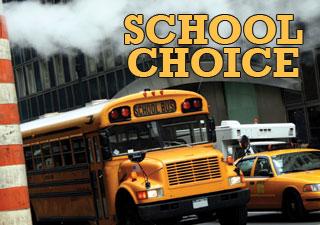Media
Patriot News (Mostly) Endorses School Choice
 This week, the Patriot News editorial board wrote an endorsement of a school voucher proposal in Pennsylvania. Here is the key pro argument:
This week, the Patriot News editorial board wrote an endorsement of a school voucher proposal in Pennsylvania. Here is the key pro argument:
The case for vouchers is obvious: There are about 150 schools in this commonwealth that have consistently underachieved. Some of those schools are in the Harrisburg School District – mere feet from the state Capitol.
Any middle-class family would simply move to a better school district or send their children to a private school. That is not an option for lower-income families.
A museum could be built for all the remedies that have been tried in failing schools and made little difference. The state has substantially increased public education funding in the last decade, there are more charter schools, and a parade of principals and superintendents have given it their best shot. There have even been state takeovers of various districts, where the elected school board steps aside and some sort of appointed board takes the reins.
While there have been pockets of success – such as Harrisburg’s SciTech High School – the overall situation remains dire in certain places. Vouchers are not another Band-Aid; they are a true game changer. If the legislation is done correctly, a student can potentially transfer from a school that is not achieving to one that is.
The editorial offers a few improvements, which merit discussion. First:
The reality is there are not enough open spaces at private and charter schools in this commonwealth to accept all the students from the state’s worst schools.
A far better option is to do what Gov. Tom Corbett said in his October education speech and allow low-income students to also use their voucher at another public school. At the moment, SB 1 does allow that, although public schools are not required to take voucher students.
To make sure everyone is clear, charter schools are public schools and cannot charge tuition. The voucher component does not affect charters. However, part of Gov. Corbett’s education reform agenda includes charter school reform, which would allow alternative authorizers of charter schools, increasing the supply and number of seats available.
In private schools, there is actually a large number of open seats. Perhaps not enough to accommodate “all” the students in the failing schools, but enough to those who will take advantage of the program in the early years. And as demand for private schools increases, so will supply.
As to the Patriot’s proposal to require public schools to participate in the voucher program and take students from other districts, this is a good policy. But it will face intense political opposition—as such a plan did during the voucher fights under Gov. Ridge—from many school boards and suburban districts.
Finally, the Patriot writes,
The House should amend the bill to make private schools — or at least students on vouchers — take PSSAs.
But the PSSA doesn’t equate to accountability. These failing public schools administer the PSSA, and 60 percent of students don’t make proficiency. This is not accountable. The PSSA is a weak test, which inflates proficiency rates. We pointed out in 2008 how the PSSA is less rigorous than the National Assessment of Educational Progress—about 80% more students make proficiency—and the latest evidence indicates that Pennsylvania’s standards are getting weaker relative to other states. Why impose a weak standard on private schools? Even public schools complain about this mandate which drives up costs and doesn’t improve education.